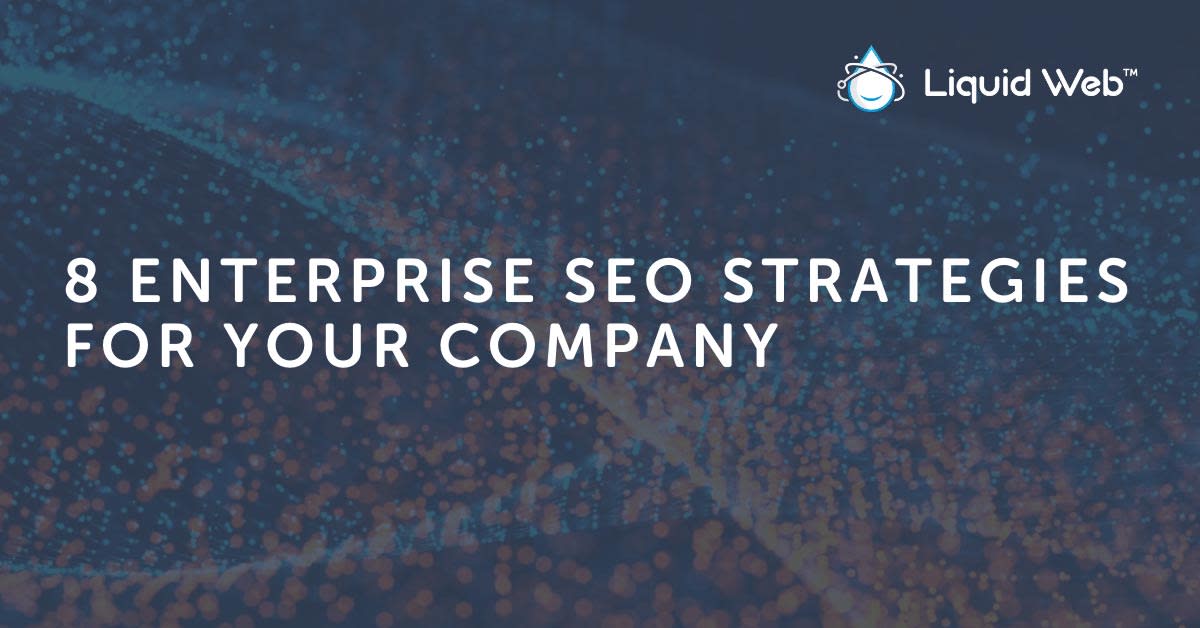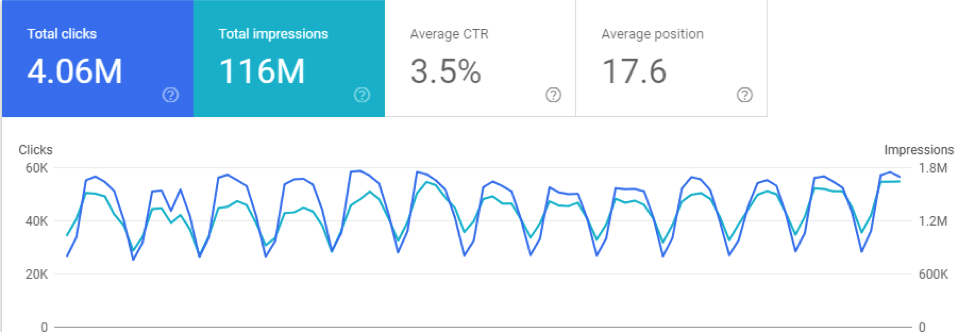
Enterprise sites have tough competition at every stage. That’s why it becomes more important to be creative and use modern enterprise SEO strategies.
A well-planned enterprise SEO strategy includes technical factors, high-quality content creation, and brand reputation.
In this guide, I’ll share some of the best enterprise SEO strategies that you must use to rank your website on Google.
Let’s start with the basics.
What is Enterprise SEO?
Enterprise SEO is an approach to get more organic traffic from Google for large enterprises and businesses.
In simple words, enterprise SEO is done on larger websites having thousands of pages.

Google search console performance report screenshot.
This type of SEO does involve a certain level of complexity. That’s why each member of the Enterprise SEO Team is assigned a specific task to make the process easier and avoid mistakes.
Enterprise SEO is done on a large scale to achieve bigger results. That’s the reason companies spend more than $25,000 each month on average for their enterprise SEO efforts.
For example, Airtel is a reputable name in the Telecom Sector but was not ranked in the top three results on Google. They held the ranking for results four through ten on page one of Search Engine Page Results (SERPs) for many keywords. Their competitors were getting the bulk of the organic traffic (and more business) by ranking in the top three positions on Google.
To get these top positions, they planned an enterprise SEO strategy for more than 2,000 keywords. Their strategy paid off, with Airtel successfully ranking 2,100 keywords in the top three search results.

Five Benefits of Enterprise SEO
Here are the five benefits of enterprise SEO:
1. Lower the Pay-Per-Click (PPC) Cost and Effort
A well-planned strategy helps you to rank on top of Google search for your most important keywords. Once you start ranking for your most important money-making terms, you can stop or reduce your PPC ad budget for those keywords. You’ll get organic traffic from Google without paying anything. Also, you can retarget that traffic on other channels like Facebook, which is cheaper than Google.
2. Streamlined Brand Messaging
Enterprise SEO helps your brand to streamline messages as per the marketing channel. But, above all, it allows you to promote tailor-made messages as per your target audience’s needs. To a great degree, enterprise SEO controls your brand’s online reputation and brand messaging to show you are a trusted brand.
3. Highly Targeted Local Marketing
Research suggests that 46% of all Google searches are local.
Enterprise SEO is a scalable solution for targeted local marketing. Your website traffic and revenue shoot up when your webpages are optimized for Google Maps (locational pages), local needs, and consumers’ preferences.
4. Expand to a New Audience
Enterprise SEO is an effective way to expand your market share and get in front of new audiences.
A good enterprise SEO campaign handles all your current product marketing and subtly expands your digital footprint. This helps your brand to compete in the long run.
5. Omni-Channel Impact
A successful enterprise SEO campaign also has an impact on other marketing channels. It helps you to reduce your marketing costs, increase engagements, conversions, and ROI.

Best Enterprise SEO Strategies in 2021
Marketers realize that SEO is more than just a set of keywords and web pages.
The exciting part is even the tiny changes in SEO strategies can lead to some fundamental shifts in your business revenues. Enterprise SEO is challenging to adapt to at the start. Having a strategy helps your brand remove these complications.
Below are the eight best enterprise SEO strategies you can use today.
1. Website Structure
If your website is not well-planned, then you can’t provide the best user experience to your audience. That will negatively impact your website SEO.
A well-organized website structure helps you to provide a better user experience. This makes your website easily accessible and helps you to boost your website metrics, sales, and conversions.
You should organize your website according to topics, subtopics, and niche topics.
Start by creating categories, subcategories, and tags. Use the Spoke-hub (pillar-cluster) model. It will help you boost the topical authority of your website.
A good rule of thumb is to keep all pages within three clicks (or folders) from the user entering the site.”
Another strategy is to analyze the user behavior on your website. Find your most important and visited pages on the website. Then, make those pages easy to access for your users by adding them to your navigation, footer, sidebar, etc.
2. Crawl Budget
This is one of the more important enterprise SEO strategies that you cannot ignore.
A crawl budget includes the number of pages a crawler sets to crawl in a certain period. Once the budget is used up, the web crawlers will stop accessing your website pages. That’s why it is crucial to manage your crawl budget properly.
The concept is simple: the more Google crawls your website, the better your website has the potential to rank.
But it will only work if Google is able to find and crawl your important pages. If not, then you’re wasting your website’s crawl budget. That will impact your website rankings.
Here’s how you can solve this issue:
- Take a look at your website logs for Google Bots.
- Check your website’s search index on Google by using search operators.
- Ensure that unimportant pages like archives, privacy policy, tags, and similar pages are no-followed and no-indexed.
- Delete or No-index older unimportant pages from your website.
- Make your website pages lighter. Avoid using too much javascript.
- Do proper internal linking (or interlinking) on your website.
Note: Be careful when making changes to your website to improve your website’s crawl budget, as unintended changes can ruin your website rankings. Get help from an SEO expert or service when in doubt.
3. Topical Authority
Topical authority favors expertise and depth of knowledge in a particular niche. If your website has high-quality, credible content about a given subject matter, then other factors just fall into place.
For instance, why do you prefer The New York Times (NYTimes) or Bloomberg over other publications? Because you know The NYTimes is best in news media and Bloomberg is the best for business-related topics.
Topical authority also works in SEO. Here’s how you can become a topical authority:
A well-researched and insightful blog post is better than creating 100 shorter posts similar to what already exists.
Cover your topic in detail with your own original research and experiences.
Also, as referenced above, having a well-organized website is important not only for navigation and SEO benefits but also to become a topical authority.
4. Content Updation
Fresh content works like oxygen for your website.
Creating content is one side of the coin, but updating it is a significant part of enterprise SEO strategy. We all know Google loves frequent updates, articles, and new and valuable information.
When you update your older content, the web crawler indexes your sites more frequently. For this reason, search engines often stop by your website and rank your fresh content on the first page.
That’s why updating your old content is an important part of your SEO strategy. If you got hit by the previous Google broad core algorithmic updates, then you should improve or repurpose your existing website content now.
Find the opportunities in your existing content, update the outdated details, and make the content more exhaustive to satisfy the search intent.
Surely, you’ll see a boost in your keyword rankings in a week or two.
5. EAT and Branded Searches
It’s all about what Google and its users want. The concept of E-A-T supports this statement.
Expertise, authoritativeness, and trustworthiness are the three pillars of the EAT process. This concept comes from Google’s Search Quality Rater guidelines. The goal was to reduce disinformation and enable trustworthiness among online web search visitors.
EAT supports enterprise SEO by granting credibility to your content. Google decides whether this information is written by an expert or not and decides whether readers should follow the advice.
Certainly, EAT is not the direct ranking factor. But Google uses a combination of algorithms that work to assess websites and webpages similar in intent to EAT.
EAT becomes more important if you’re working in the YMYL (Your Money Your Life) niche. Google is very serious and wants to provide genuine results related to health and money topics.

Example of an article within the YMYL niche.
Publishing on media publications and industry sites, as well as showing details about your company, team, author, recognitions, and awards, will help you to boost your Website’s EAT.
Along with EAT, you should focus on improving your brand searches.
When users search a business by its name on Google, then it sends a positive signal to Google about your business. Google respects you as an authority and prefers to rank you higher than others.
That’s why you should focus on increasing brand-related queries for your business.
6. Optimize for Voice Search
Technology is evolving every second; by the time you finish reading this sentence, one new app has already been updated. Utilizing the latest technology is one of the best enterprise SEO strategies to stay ahead of the competition.
Voice SEO optimization is one such technology that can’t be ignored. Many people prefer to search queries on Google by speaking rather than typing the query. So, if your website is not optimized for voice search queries, you’ll lose your customers.
That’s why voice optimization must be on your enterprise SEO strategy list.
To optimize your website for voice search, you should:
- Focus on conversational keywords.
- Properly structure your content by using lists and H tags.
- Add only 2-3 lines in a paragraph.
- Add FAQ sections.
- Implement speakable and other schema types.
7. Conduct Timely Enterprise SEO Audits
You need to perform detailed enterprise SEO audits from time to time. Managing a larger site is more complex. There can be issues that you can’t figure out with a simple look on your site.
You should perform professional SEO audits 2-3 times every year. At a minimum, one of those must be from a professional SEO expert or company. It will further reduce the chance of mistakes and help you adapt the right enterprise SEO strategies as your enterprise grows.
You must create an audit checklist that will help your team conduct the audit analysis hassle-free. You can divide your checklist into different parts such as a technical SEO audit, content audit, and link audit. This will help you to complete your audit without skipping anything.
Create a short report after all the analysis is complete for future references. Keep a track record of everything.
After auditing the website, start with small changes first. Don’t make more than one change at a time. Also, always keep a record of every change that you are making on your site with the date and time. It will help you understand what’s working or what’s not.
8. Links and Digital PR
Link building and digital PR go hand in hand in SEO strategy. Good content is of no use if there is no proper outreach source for it.
Optimizing links is a crucial part of any PR strategy. This is where high-quality backlinks help your business. In this situation, your SEO team should be helping your PR team to execute this strategy.
It often includes companies’ press releases, paid and unpaid stories, producing content that includes specific links, and more. Always try to get relevant links from high-authority sites. These kinds of links will not be easy for your competition to copy and will boost your rankings for the long term.
Digital PR works as a helping hand in building links from various influencers, media houses, and social media with the help of PR campaigns.
Finally, these websites link back to your company’s sites, allowing Digital PR to contribute to your SEO strategy.
Get Started With Enterprise SEO Today
As a growing brand, your company has a massive opportunity to evolve.
Enterprise SEO may seem a little confusing in the initial stage, but in the end, all you need is a loyal audience, a diligent team, and a proven process.
When you put money where your results are, you protect your brand value and spend your money more practically. A good enterprise SEO strategy serves you in both cases.
6 Reasons to Choose Liquid Web for Enterprise Hosting
Liquid Web offers cloud products to fulfill the needs of enterprise businesses. We provide custom solutions according to your requirements and work with you 24/7.
Here are the main reasons to choose Liquid Web for Enterprise Hosting:
- Uptime: Your website must always be accessible to users as well as Google to crawl. For that, your web host must have higher uptime. Having web hosting with good uptime is also important for SEO. In 2020, Liquid Web had an uptime of 99.998%, which is very SEO-friendly for a website.
- Website Speed:Website performance is one of the critical factors to ranking on Google. It also impacts your website conversions. Web hosting has an important role in reducing your page load time. Liquid Web uses the latest technologies and infrastructure to load your website at blazing-fast speed.
- Security: Liquid Web’s latest technologies provide world-class security to your website from hackers, bots, and other spamming activities. They continually check their servers for malicious codes and also have a spam expert team to protect your website.
- Server Locations: Server locations impact website load time. You should ask a company about their server locations before purchasing. Liquid Web has its privately-owned data centers and a team of experts to monitor your network performance and to provide top-notch service.
- CDN: Liquid Web offers Content Delivery Networks (CDNs) to further boost your website performance through Cloudflare and Akamai.
- Support: Liquid Web guarantees an initial response in 59 seconds, and the Support Team is always here to help you, 24/7/365.
[ad_2]
Source link

![Enterprise SEO Strategies [8 Best Methods for 2021]](https://dealzclick.com/wp-content/uploads/2022/02/Lenovo-ThinkVision-T86-ThinkVision-T75-ThinkVision-T65-Large-Format-Displays.jpg)
![Enterprise SEO Strategies [8 Best Methods for 2021]](https://dealzclick.com/wp-content/uploads/2022/02/Brain-Training-For-Dogs-Adrienne-Farricellis-Online-Dog-Trainer.jpg)



